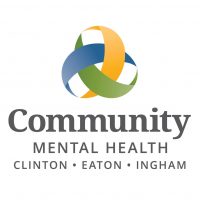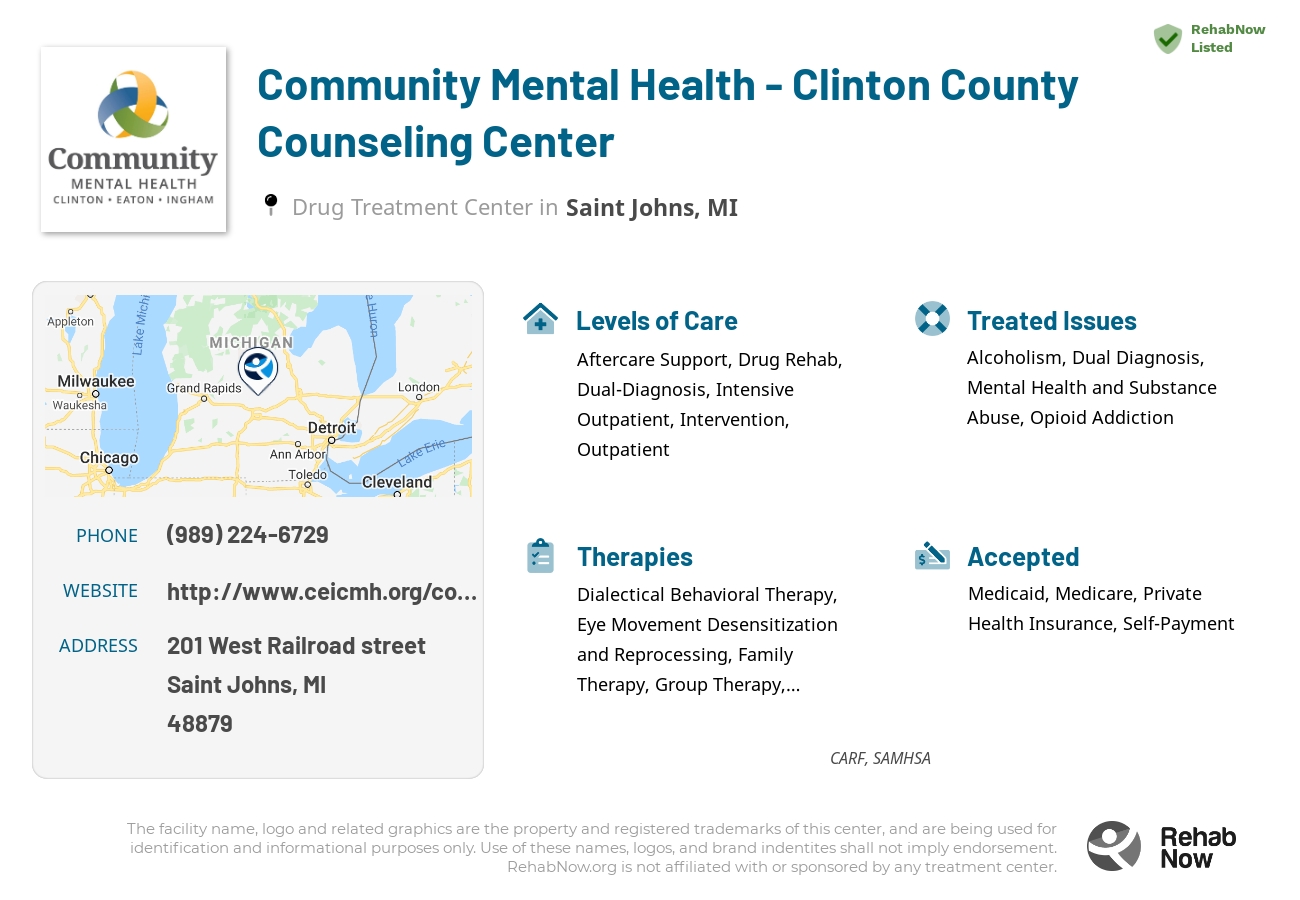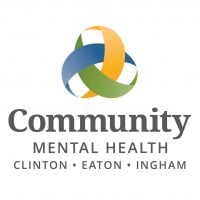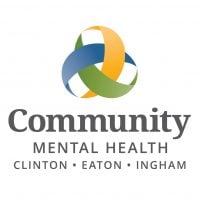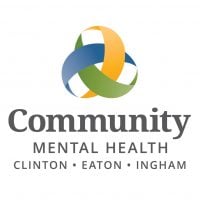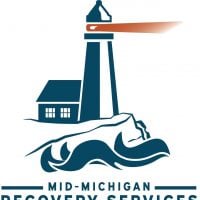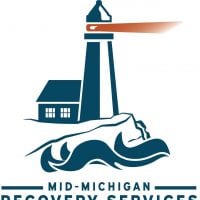Community Mental Health - Clinton County Counseling Center
Drug Rehab Center in Saint Johns, Michigan
Clinton County Counseling Center is a CARF- and SAMHSA-accredited addiction treatment facility located in Saint Johns, MI, offering various levels of drug rehab care with dual-diagnosis services, aftercare support, and private health insurance acceptance.
About Community Mental Health - Clinton County Counseling Center in Michigan
Community Mental Health - Clinton County Counseling Center, situated in the heart of Saint Johns, Michigan, focuses primarily on outpatient treatment for mental health, substance abuse, and dual diagnosis issues. Utilizing a spectrum of evidence-based practices like CBT and DBT, the center stands out for its commitment to a person-centered, recovery-oriented approach that's both culturally competent and trauma-informed. This dedication ensures a supportive environment for individuals on their journey to sobriety.
- Specializes in a comprehensive approach to substance abuse and mental health, ensuring treatments are tailored to individual needs.
- Accredited by CARF and SAMHSA, reflecting their commitment to high-quality, professional care.
- Offers a wide array of evidence-based treatment modalities, from CBT and DBT to Motivational Interviewing and supportive psychotherapy, catering to a diverse range of patient needs.
Clinton County Counseling Center holds accreditations from CARF and SAMHSA, highlighting their excellence in providing high-quality services to those in need. Through a variety of treatment modalities and a focus on outpatient programs, the center fosters an environment where individuals can work towards recovery in a manner that respects their personal journey and addresses both addiction and underlying mental health issues.
The center specifically treats addictions such as Alcoholism, Opioid Addiction, Drug Addiction, and co-occurring mental health disorders, utilizing methods like CBT, DBT, and Motivational Interviewing. Available levels of care include Intensive Outpatient programs, Drug Rehab, Dual-Diagnosis Treatment, and Aftercare Support, designed to support individuals at every stage of their recovery process.
Genders
Ages
Modality
Additional
Accreditations
SAMHSA

CARF
The Commission on Accreditation of Rehabilitation Facilities (CARF) is a non-profit organization that specifically accredits rehab organizations. Founded in 1966, CARF's, mission is to help service providers like rehab facilities maintain high standards of care.
Conditions and Issues Treated
Opioids are a group of drugs that include substances such as heroin, morphine, and oxycodone. These drugs activate opioid receptors in the brain, which produce pleasurable feelings. Opioid addiction occurs when drugs are abused at increasing rates or increasing amounts because the body becomes tolerant of them.
Opioid addiction is typically diagnosed when drug abuse becomes a typical behavior that interferes with an individual’s ability to function daily. The use of the substance results in consequences like legal problems.
Treatment for opioid addiction varies depending on each individual’s needs. Some treatments focus on replacing opioids with other drugs that have similar effects of reducing withdrawal symptoms. Other treatments aim to reduce the risk of relapse by providing psychological support or using more natural methods.
A drug rehab center that uses Dual Diagnosis is more likely to be successful in rehabilitating a person. Dual diagnosis helps to identify and treat any co-occurring disorders. It is essential to screen for both addiction and any untreated mental health issues. A dual diagnosis gives rehab the means to treat addiction while restoring mental and emotional health.
About 70% of patients with drug addiction have at least one other psychiatric diagnosis. Fortunately, dual diagnosis treatment is a proven model that has been highly effective.
Levels of Care Offered
This center offers a variety of custom treatment tailored to individual recovery. Currently available are Aftercare Support, Drug Rehab, Dual-Diagnosis, Intensive Outpatient, Intervention, Outpatient, with additional therapies available as listed below.
An intensive outpatient program is usually the first phase of addiction treatment. It provides relief for those addicted, but not ready to commit to an inpatient setting. IOPs consist of a daily 3 to 5-hour program, and there is a required number of hours per week. The goal here is to teach patients healthy coping skills, such as stress management.
Outpatient programs offer a lower intensity level of addiction treatment than inpatient facilities. They are ideal for those who have graduated from inpatient facilities, have a supportive home environment, and are motivated to commit to the program. Services offered include medication-assisted treatment, individual and group therapy, and peer group support.
This treatment is a popular option for those suffering from a lower intensity addiction. It is not advisable for someone who needs to go through a medically supervised detox or does not have a supportive home environment. It requires motivation and dedication to commit to the program without constant monitoring.
Interventions help families and friends express their feelings, express their desire for change, and plan for action. Interventionists are trained professionals who help family members plan or lead interventions. Family members should help choose an experienced professional to guide their loved one through treatment. Across the country, intervention services are available.
Aftercare Support in drug rehab is crucial because it helps people stay sober after treatment. Aftercare Support in drug rehab is helpful because it provides the recovering person with a support group, including family members, friends, and other peers who are also in recovery.
The benefits of Aftercare Support are that it provides a pathway that will help people get sober for life. It supports healing at all levels, physical, mental, emotional, and spiritual. Another benefit of Aftercare Support is that participants learn to maintain their sobriety through holistic methods. They learn to modify behaviors individually to have peace of mind, have positive relationships with others, and find peace on the inside.
Therapies & Programs
During individual therapy at Community Mental Health - Clinton County Counseling Center in , the person in recovery meets with a therapist one on one to go over their situation and learn from past mistakes. The counselor or therapist will use this time to address the causes of addiction, triggers, and any mental issue or dual diagnosis. They will also address aftercare plans, giving them the best chances of long-term sobriety.
This therapeutic process is very intense and challenging to go through. Some clients may find it easier to open up with someone apart from their family or loved ones who understand their struggles and experience with addiction.
Family therapy is designed to help addicts get clean and sober by using what they love the most; their family. Most drug treatment centers make it mandatory that the addict’s family attend therapy sessions, which is great because having everyone there to support them makes it much easier for them to get clean. Not only are they surrounded by people who want them to get better, but everyone is there because they want the best for them, not because they feel like they have to be.
Drug addicts are often surrounded by resentful or uneducated family members who would, at times, rather see them stay addicted because it makes their own lives easier. Sometimes they don’t understand what the addiction is or how they play a part in it. They know that during and after the addict’s sobriety journey, they will face challenges and changes that they aren’t sure how to handle. This can be very tough for an addict to go through on their own, which is why it’s so important that they have the support of their family. Just because someone is an addict does not mean that they don’t deserve the love and support of those around them.
Addicts in Saint Johns, MI can find support in group therapy at Community Mental Health - Clinton County Counseling Center by finding peers who understand their situation and being held accountable. They also learn to develop faith, understanding, and insight into their addiction through shared conversations.
Group Therapy is employed by drug treatment centers to provide the recovering addict with a platform to talk about their feelings and experiences. It also provides for an opportunity to learn from other addicts who have successfully overcome their addiction. It is recommended that all group members be recovering addicts for this type of therapy to work.
Trauma therapy allows people who struggled with a past trauma to face the situation and learn from it. Many people go through traumatic events at an early age that later leads them into addiction as adults. By addressing this issue during treatment at Community Mental Health - Clinton County Counseling Center in [/type], you can move forward with your recovery process and take back control of your sober future, too!
Traumas are one of the most common causes of psychological disorders such as Addiction Disorder. It’s often found among those diagnosed with Addictive Disorders because traumatized individuals have strong emotions or thoughts related to their traumas, leading to addictive behaviors.
Dialectical behavior therapy (DBT) is a cognitive-behavioral therapy that focuses on eliminating specific negative thoughts, such as suicidal thoughts. These negative thoughts can potentially lead to an individual inflicting self-harm. It helps treat patients exhibiting uncontrollable emotions, intense mood swings, and borderline personality disorders.
The term “Dialectic” means the integration of opposites. In substance abuse, DBT refers to accepting the patient’s addiction and working to change their thoughts and behavior. It improves life skills such as controlling intense emotions without reacting impulsively, resolving interpersonal conflicts effectively, and promoting awareness about self and others.
Cognitive Behavioral Therapy (CBT) helps addicts comprehend the causes of their substance abuse and the consequences that follow. The treatment’s goal is to help addicts gain self-control and maintain abstinence from drugs and alcohol over the long term. Through CBT, clients learn to recognize and avoid high-risk situations and cope with challenging situations when they arise.
Eye movement desensitization and reprocessing, or EMDR, is another therapeutic technique typically used for addiction recovery. This type of therapy works by stimulating brain activity to help the addict process past emotions without relapsing on their drug of choice.
EMDR can be particularly effective for recovering addicts who have trouble recalling the events that lead up to their addiction. By helping the addict recall these memories under safe conditions, this therapy can help reduce their risk of relapse during difficult moments.
Payment Options Accepted
For specific insurance or payment methods please contact us.
Is your insurance accepted?
Ask an expert, call (888) 674-0062
Community Mental Health Associated Centers
Discover treatment facilities under the same provider.
- Community Mental Health - The Recovery Center in Lansing, MI
- Community Mental Health - House of Commons in Mason, MI
- Community Mental Health - The Recovery Center in Lansing, MI
- Community Mental Health - Cedar Street in Lansing, MI
- Eaton County Counseling Center in Charlotte, MI
Learn More About Community Mental Health Centers
Additional Details
Specifics, location, and helpful extra information.
Saint Johns, Michigan 48879 Phone Number(989) 224-6729 Meta DetailsUpdated April 15, 2024
Staff Verified
Community Mental Health - Clinton County Counseling Center Patient Reviews
There are no reviews yet. Be the first one to write one.
Saint Johns, Michigan Addiction Information
Michigan has the second-highest rate of drug and alcohol abuse in the nation. Heroin is linked to more than 50% of the state's hepatitis C cases. Marijuana is the drug most often associated with crimes in Michigan, followed by methamphetamines. Opioids alone are responsible for almost 20% of all drug overdose deaths in Michigan.
Treatment in Nearby Cities
- Howell, MI (42.2 mi.)
- Auburn Hills, MI (70.7 mi.)
- Mason, MI (30.0 mi.)
- Saint Johns, MI ( mi.)
- Washington, MI (79.8 mi.)
Centers near Community Mental Health - Clinton County Counseling Center
The facility name, logo and brand are the property and registered trademarks of Community Mental Health - Clinton County Counseling Center, and are being used for identification and informational purposes only. Use of these names, logos and brands shall not imply endorsement. RehabNow.org is not affiliated with or sponsored by Community Mental Health - Clinton County Counseling Center.
